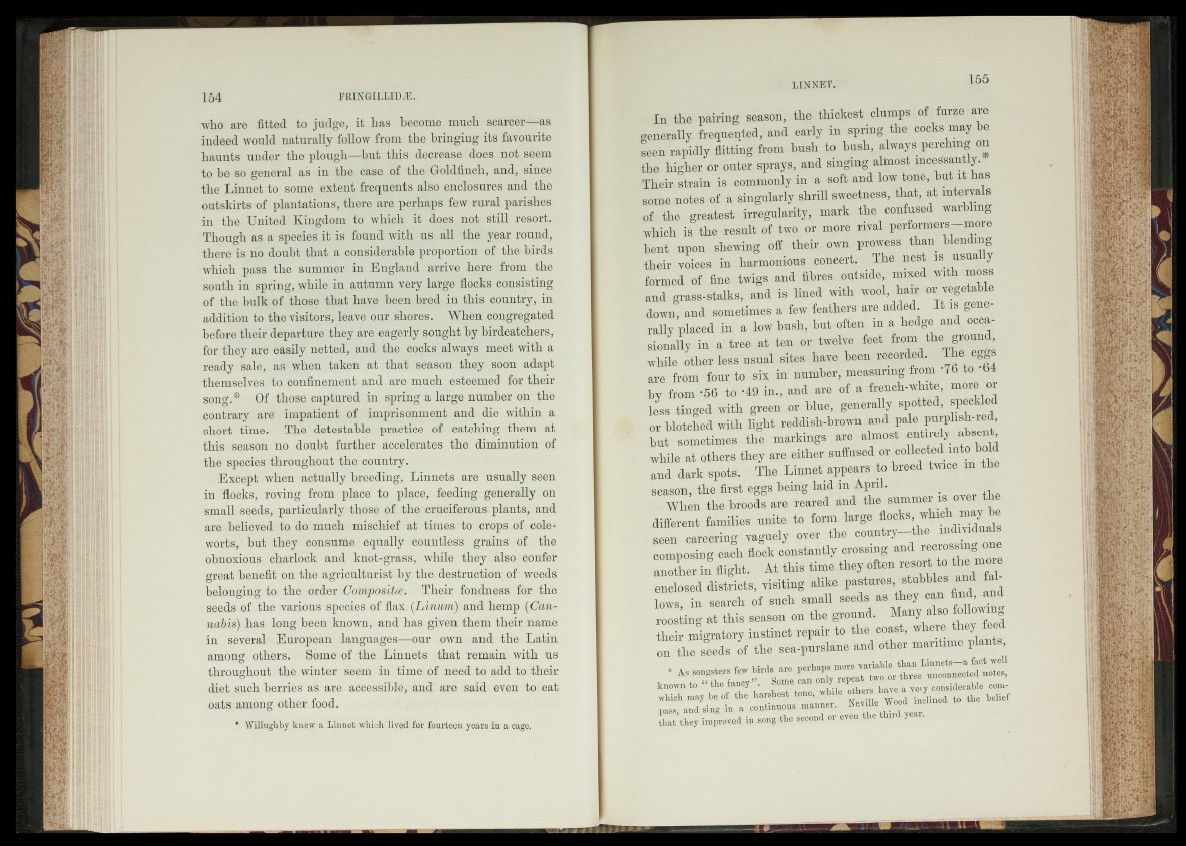
who are fitted to judge, it has become much scarcer—as
indeed would naturally follow from the bringing its favourite
haunts under the plough—but this decrease does not seem
to he so general as in the case of the Goldfinch, and, since
the Linnet to some extent frequents also enclosures and the
outskirts of plantations, there are perhaps few rural parishes
in the United Kingdom to which it does not still resort. ,
Though as a species it is found with us all the year round,
there is no doubt that a considerable proportion of the birds
which pass the summer in England arrive here from the
south in spring, while in autumn very large flocks consisting
of the bulk of those that have been bred in this country, in
addition to the visitors, leave our shores. When congregated
before their departure they are eagerly sought by birdcatchers,
for they are easily netted, and the cocks always meet with a
ready sale, as when taken at that season they soon adapt
themselves to confinement and are much esteemed for their
song.* Of those captured in spring a large number on the
contrary are impatient of imprisonment and die within a
short time. The detestable practice of catching them at
this season no doubt further accelerates the diminution of
the species throughout the country.
Except when actually breeding, Linnets are usually seen
in flocks, roving from place to place, feeding generally on
small seeds, particularly those of the cruciferous plants, and
are believed to do much mischief at times to crops of cole-
worts, but they consume equally countless grains of the
obnoxious charlock and knot-grass, while they also confer
great benefit on the agriculturist by the destruction of weeds
belonging to the order Composites. Their fondness for the
seeds of the various species of flax (Linum) and hemp (Cannabis)
has long been known, and has given them their name
in several European languages—our own and the Latin
among others. Some of the Linnets that remain with us
throughout the winter seem in time of need to add to their
diet such berries as are accessible, and are said even to eat
oats among other food.
* Willughby knew a Linnet which lived for fourteen years in a cage.
LINNET.
In the pairing season, the thickest clumps of furze are
generally frequented, and early in spring the cocks may be
seen rapidly flitting from bush to bush, always perching on
the higher or outer sprays, and singing almost incessantly.
Their strain is commonly in a soft and low tone, u 1 as
some notes of a singularly shrill sweetness, that, at intervals
of the greatest irregularity, mark the confused warbling
which is the result of two or more rival performers-more
bent upon shewing off their own prowess than blending
their voices in harmonious concert. The nest is usually
formed of fine twigs and fibres outside, mixed with moss
and grass-stalks, and is lined with ^ooi lum- or vegetab e
down, and sometimes a few feathers are added It is generally
placed in a low hush, but often in a hedge and occasionally
in a tree at ten or twelve feet from the giound,
while other less usual sites have been recorded. The eggs
are from four to six in number, measuring from -76 to -64
by from -56 to *49 in., and are of a french-white, moie oi
less tinged with green or blue, generally spotted, speckled
or blotched with light reddish-brown and pale purplish-led,
but sometimes the markings are almost entirely absen
while at others they are either suffused or collectedmto.bold
and dark spots. The Linnet appears to breed twice m th
season, the first eggs being laid in April.
When the broods are reared and the summer h
different families unite to form large flocks which may be
• i r mTDv ronntrv—seen careering vaguely ovei the coun y tliB indiv.iduals
composing each flock constantly crossing and reciossmg one
another in flight. At this time they often resort o the mom
enclosed districts, visiting alike pastures stubbles and fal
lows in search of such small seeds as they can find, and
roosting at this season on the ground. Many also
their migratory instinct repair to the coast, where they feed
on the seeds of the sea-purslane and other mantime plants,
* As songsters few birds are !»rhaps more | K g I i | | | M H
known to “ the fancy’ . Some can have a considerable com-
-which may be of the harshest on . inclined to the belief
pass, and sing E M — H M year.